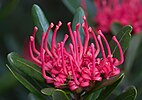Wikipedia:Today's featured article/February 10, 2016
Telopea truncata, commonly known as the Tasmanian waratah, is a plant in the family Proteaceae. It is endemic to Tasmania where it is found on moist acidic soils at altitudes of 600 to 1200 m (2000–4000 ft). A component of alpine eucalypt forest, rainforest, and scrub communities, T. truncata grows as a multistemmed shrub to a height of 3 metres (10 ft), or occasionally as a small tree, with red flower heads, known as inflorescences, that appear over the Tasmanian summer (November to February) and bear 10 to 35 individual flowers. Yellow-flowered forms are occasionally seen, but do not form a population distinct from the rest of the species. Collected by French botanist Jacques Labillardière in 1792–93, T. truncata was first described in 1805. Genetically the most distinctive of the five waratah species, Tasmanian waratah can be cultivated in temperate climates, requiring soils with ample moisture and good drainage and in partly shaded or sunny positions. Several commercially available cultivars have been developed that are hybrids of T. truncata with the New South Wales waratah (T. speciosissima) and Gippsland waratah (T. oreades). (Full article...)
